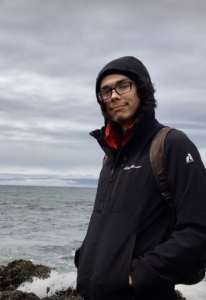Our Staff
The Executive Director & staff shall manage the organizational affairs, carry out the duties as assigned by the Executive Board, and pursue the established goals of the Affiliated Tribes.
The Executive Director & staff shall manage the organizational affairs, carry out the duties as assigned by the Executive Board, and pursue the established goals of the Affiliated Tribes.

Amber Schulz-Oliver an American Indian (Celilo/ Yakama Descendant) Oregonian and has established firm roots in Portland, Oregon. As Executive Director of Affiliated Tribes of Northwest Indians Economic Development Corporation (ATNI-EDC), she is dedicated to assisting ATNI Member Tribes fulfill their economic development goals and priorities. ATNI-EDC has a subsidiary organization, ATNI Financial Services, that is a Community Development Financial Institution (CDFI) and provides loans to Native American entrepreneurs that may not otherwise be able to obtain financing.
Amber graduated from Oberlin College in 2001 and soon after joined the Peace Corps. She then worked at a Native American owned Engineering firm, Akana, where she managed several projects in and for the benefit of Indian Country. She moved on to work for the non-profit organization, Ecotrust on a project to research the economic development needs, goals, and priorities of ATNI member tribes, and evaluated the feasibility of a fellowship model to meet some of those goals. In 2013, Ms. Schulz-Oliver earned her MBA, graduating with honors from Willamette University.
Amber serves as the President of the Potlatch Fund, Co-Chair of newly established Nch’I Wana Housing, and as board members of the Oregon Growth Board, and on the advisory boards of Ecotrust Community Development Entity, and Ecotrust Investments. She is committed to social and economic justice, environmental stewardship, sustainability, protecting Tribal sovereignty, and service to the Native community.
Email: Ambers@atnitribes.org

The Administrative Support Specialist plays a critical role in assisting Affiliated Tribes of Northwest Indians (ATNI) by carrying out administrative tasks associated with support and project operations, with a specific emphasis on delivering exceptional service to both support personnel and tribal members.
Being raised in rural Southern Oregon, Tyrel has been instilled with a deep appreciation for the importance of community and its profound effects on both individual and collective well-being. Tyrel holds a Bachelor’s degree in Kinesiology and aspires to further their education by pursuing a graduate degree in Public Health.
Email: tott@atnitribes.org

Tanya Eison is a citizen of Quinault Indian Nation and a Natural Resources Program Manager for ATNI. She holds a Bachelor of Arts in Environmental Studies from the University of Washington Tacoma and a Master of Marine Affairs from the University of Washington where her graduate research studied Tribal equity within a Washington floodplain management program. Prior to joining ATNI, Tanya worked at Washington Conservation Action (formerly Washington Environmental Council and Washington Conservation Voters) where she helped increase the board membership to above a 50% BIPOC majority for the first time in the organization‘s history. She also spent a decade working for her tribe as the Legislative Aide for the Vice President and in the environmental protection department’s fish habitat and wildlife sections. Additionally, her experience with the National Oceanic and Atmospheric Administration(NOAA) allowed her to explore opportunities where NOAA and the Northwest Indian College could partner to increase Indigenous students that advance into federal positions. Tanya is dedicated to working with the environment and the Tribal nations in the Northwest that are asserting their sovereignty to protect and manage their natural resources as they deem fit.
Email: Tanya@atnitribes.org

Honor, Pride, and Respect. These values serve as the foundational structure for Patrick Austin Freeland (Wind Clan, Muscogee Nation of Oklahoma) and centers his commitment to advancing Tribal sovereignty and fostering intercultural relationships to adapt to climate change and promote resilience within our shared communities, Nations, and planet. Patrick currently resides in the usual and accustomed territories of the Lhaq’temish and Nooksack Peoples in Bellingham, Washington.
Climate adaptation and tribal resilience and wellbeing are at the heart of Patrick‘s professional vocation. Integrating noncognitive development, open-access educational and scientific initiatives, and intergenerational knowledge sharing centering: Sovereignty, Relationality, and Responsibility. Patrick strives to embody and promote inclusion, diversity, equity, and accessibility (IDEA) in practice, principles, and value systems that build connections between Peoples. Patrick is a first-generation college student, and walked an educational pathway shaped by experiences at Haskell Indian Nations University and Purdue University, in creative writing, Indigenous and American Indian studies, and ecological sciences and engineering. Patrick has served roles as a scholar, faculty, mentor, and coach and continued research and educational techniques reflect an unwavering dedication to respectful and ethical inquiry, civic engagement and service. His professional philosophy weaves together a rich tapestry of interdisciplinary sciences, arts, and engineering, with the principal focus of advancing human and environmental well-being. Patrick’s mission involves navigating the boundaries of societal progress, advancing excellence in design, and fostering intercultural understanding through the lens of truth and reconciliation.
Email: Patrickfreeland@atnitribes.org

Kylie Avery is an enrolled Shawnee tribal citizen and serves as the Assistant Tribal Climate Resilience Liaison for ATNI. In her role, she also supports the Northwest Climate Adaptation Science Center. Kylie began working with ATNI as a Strategic Energy Innovation’s Climate Corps Fellow in the summer of 2022 and was hired into her current role in early 2023. She is a first-generation college graduate and earned a Bachelor of Science in Animal Biology and a minor in Native American Studies from the University of California, Davis.
Email: kavery@atnitribes.org

Reuben Martinez is a member of the Makah Nation. He holds a Bachelor’s degree in Economics from Western Washington University (2020) and a Master of Marine Affairs from the University of Washington (2024). His passion for climate resilience work started while at Northwest Indian College in Bellingham Washington, where he began exploring Tribal strategic energy plans. This led him to a Policy Analyst position at Renewable Northwest. A renewable energy advocacy organization specializing in policy work, where he helped co-write the Tribal Solar Barriers Report.
Afterwards, Reuben worked at Spark Northwest as a Tribal liaison where he managed the Energy Transition Initiative Partnership Project (ETIPP), a federal initiative to help islanded communities with technical support. He was responsible for outreach and engagement with Tribes on the Westcoast, and for the development of strategic energy plans.
Reuben is committed to supporting Tribal Nations interested in energy initiatives and is eager to contribute his expertise to an organization that serves a diverse range of Tribal communities
reuben@atnitribes.org

Eli Duncan Gilmour is a graduate of American University with a degree in International Relations focusing on Sustainability and Global Health. Eli is also the co-founder of the Energy Democracy Coalition, a non-profit organization using documentary films to show how marginalized communities are fighting for a say in our energy system. Before attending college, Eli worked as a political organizer, mobilizing volunteers to elect climate-smart leaders and helping to pass landmark environmental legislation in his home state of New York. Eli has also served as an alternate on his local planning board, and today, he lives in Washington, DC, where he works remotely as ATNI’s Tribal Energy Liaison.
Email: eli@atnitribes.org
The Affiliated Tribes of Northwest Indians: Regional Office
P.O Box 66209, Portland OR 97290
PH: 503.249.5770
E: atni@atnitribes.org
